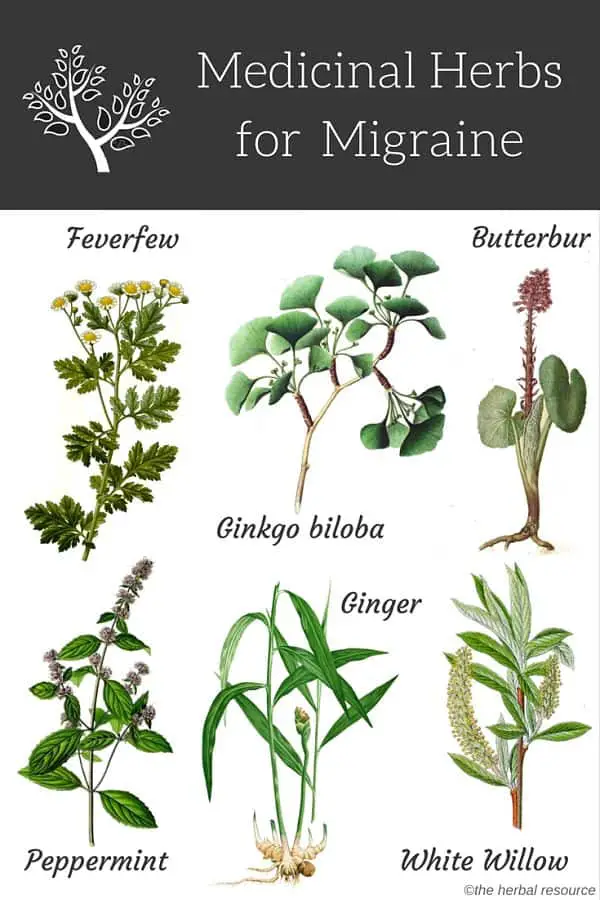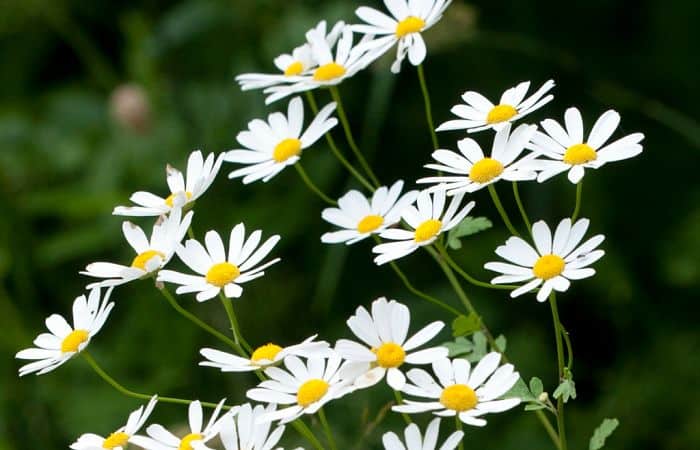Medicinal herbs for migraines relief can be of great help to alleviate the associated pain as they work towards reducing the frequency and severity of migraines.
Most herbal migraine remedies focus on the cause of it and the long-term improvement of a person’s health and not merely reducing the pain due to a migraine.
Medicinal herbs for migraine are often combined with minerals and vitamins as a holistic approach to reducing the incidence and severity of this debilitating condition.
Caution is advised when considering medicinal herbs for migraines.
It is important to consult a healthcare professional before using any herbal treatment. Some medicinal herbs can cause side effects and they can also interact with conventional medication.
Medicinal Herbs for Natural Migraines Treatment
Feverfew
Feverfew (Tanactum parthenium), as its name suggests has long been used to treat fever.
Over the last few decades, this herb has gained a reputation for migraines relief, and when used over time, has shown to lessen the occurrence of migraines.
One 2006 study that combined feverfew with white willow bark showed a 57% reduction in migraines at six weeks with a 67% reduction in migraines at ten weeks. Severity and duration of the migraines were markedly reduced in 90% of the study group.
The main active constituent in feverfew is thought to be a parthenolide, which acts as an anti-inflammatory and is being indicated in early studies as a treatment for leukemia.
Studies using just one compound from feverfew do not seem to have the same success as taking the whole herb, which leads to the question of what other, yet to be discovered, compounds give feverfew its reputation in the natural treatment of a migraine headache.
Reducing the occurrence of migraines should be the goal of any sufferer. Feverfew appears to be an effective way to achieve this when taken in combination with white willow, magnesium and a quality B vitamin containing riboflavin.
The recommended dosage of any herbal medication should be followed as side effects from even the mildest of herbs can occur when they are abused.
While there have been studies that show great results by taking feverfew, there are others that question the efficacy of this plant and further investigation with larger groups of migraine sufferers is indicated. (1)(2)
White Willow Bark
White Willow Bark (Salix alba) should be avoided by those who are allergic to aspirin. However, white willow does not cause stomach upsets that can occur when using aspirin.
The active compound in white willow bark is salicin which reduces pain by inhibiting prostaglandins. One recent study indicated that feverfew and white willow had a greater effect when used in combination than when taken on their own. (3)
Caution should be taken by those using any blood thinning medications and it is important to consult a health care provider before using white willow as a remedy for a migraine.
Butterbur
Butterbur (Petasites hybridus) is controversial in that while it is recommended to reduce the frequency of migraines and is known to lessen the severity of a migraine when it occurs; it does raise concerns due to pyrrolizidine alkaloids found in its raw state which can cause liver toxicity and are believed to be carcinogenic. (4)
Some suppliers of butterbur medications state that these alkaloids have been removed, and further investigation is needed to confirm its safety.
Butterbur is also prescribed for hay fever symptoms as it does not have the same sedative action as other hay fever medications.
Ginkgo
Ginkgo biloba is often used to increases blood circulation. It may be helpful in preventing migraine due to its ability to inhibit platelet activating factor also known as PAF.
Few small clinical trials have indicated that it could be helpful as an herbal remedy for the management of migraines. Additional and larger studies are needed to fully confirm its uses as a treatment in this regard. (5)
The recommended daily dose can range from 120 to 240 mg of a standardized ginkgo biloba extract containing 24-percent ginkgo-flavone glycosides and 6-percent terpene lactones.
Ginger
Ginger (Zingiber officinale) has been used in Chinese herbal medicines for over 2,000 years for a variety of ailments, including headaches, nausea, arthritis, common cold and flu.
Ginger has anti-inflammatory, antiviral and antifungal properties.
A study from 2014 published in the Journal of Phytotherapy Research showed it had the same therapeutic effect as sumatriptan, a common conventional migraine medication, but resulted in fewer side effects. (6)
Ginger is well tolerated by most people but those on blood thinner medication should not use it because of possible interactions.
Peppermint
The essential oil of peppermint (Mentha x piperita) is another herbal remedy that might be helpful for people suffering from a migraine.
The herb has numerous health benefits and has been used as a home remedy for ailments like bloating, excessive gas, menstrual cramps, allergies, and pain.
Peppermint essential oil has both constricting and dilating effect on the vascular system (circulatory system). One of the causes of the pain associated with migraine pain is insufficient blood flow. Peppermint oil has been shown to increase blood flow to the forehead after localized external application. (7)
Peppermint has also be used to relieve nausea that sometimes accompanies migraines.
Peppermint can be used in tea form as a remedy for nausea and the essential oil can be applied diluted to the forehead and temples. The herb is well tolerated by most people and easily available.
Other natural herbs that have been used for migraine relief.
- Arnica montana – (Arnica montana)
- Great Mullein – (Verbascum thapsus)
- Boneset – (Eupatorium perfoliatum)
- Jamaica Dogwood – (Piscidia erythrina)
- Lovage – (Levisticum officinale)
- Tansy – (Tanacetum vulgare)
- Sweet Basil – (Ocimum basilicum)
- Bogbean – (Menyanthes trifoliata)
- Bay laurel – (Laurus nobilis)
- Kudzu – (Pueraria lobata)
- Evodia – (Evodia rutaecarpa)
- Betony – (Stachys officinalis)
- Eastern Teaberry – (Gaultheria procumbens)
Vitamins, Minerals and Other Natural Supplements for Migraine Relief
In addition to using herbs for migraines relief, vitamins and minerals can play an important role in managing migraine.
Magnesium is a common deficiency in people suffering migraines and particularly important in maintaining the tone of blood vessel walls, reducing spasms that are believed to be associated with migraines. (8)
Vitamins B2 and B6 have also had considerable success in treating migraine along with CoEnzyme Q10 to reduce the pain and recurrence of migraine headaches. (9)
Many herbal supplements for natural migraines treatment include these vitamins and minerals as part of a holistic approach to managed migraine.
When investigating herbal migraine treatments, visiting a healthcare specialist to investigate the cause of any recurring headaches is vital before commencing treatment.
Supporting References
- Pareek, A., Suthar, M., Rathore, G. S., & Bansal, V. (2011). Feverfew (Tanacetum parthenium L.): A systematic review. Pharmacognosy reviews, 5(9), 103–110. doi:10.4103/0973-7847.79105
- Wider B, Pittler MH, Ernst E. Feverfew for preventing migraine. Cochrane Database of Systematic Reviews 2015, Issue 4. Art. No.: CD002286. DOI: 10.1002/14651858.CD002286.pub3.
- Shrivastava, Ravi Bahadur, Jean C Pechadre, and Gareth W. John. “Tanacetum parthenium and Salix alba (Mig-RL) combination in migraine prophylaxis: a prospective, open-label study.” Clinical drug investigation 26 5 (2006): 287-96 .
- R. B. Lipton, H. Göbel, K. M. Einhäupl, K. Wilks, A. Mauskop; Petasites hybridus root (butterbur) is an effective preventive treatment for migraine. Neurology Dec 2004, 63 (12) 2240-2244; DOI: 10.1212/01.
- Allais, Gianni & D’Andrea, Giovanni & Maggio, Maurizio & Benedetto, Chiara. (2013). The efficacy of ginkgolide B in the acute treatment of migraine aura: An open preliminary trial. Neurological sciences: official journal of the Italian Neurological Society and of the Italian Society of Clinical Neurophysiology. 34 Suppl 1. 161-3. 10.1007/s10072-013-1413-x.
- Maghbooli, M. , Golipour, F. , Moghimi Esfandabadi, A. and Yousefi, M. (2014), Comparison Between the Efficacy of Ginger and Sumatriptan in the Ablative Treatment of the Common Migraine. Phytother. Res., 28: 412-415. doi:10.1002/ptr.4996
- Göbel, Hartmut & Schmidt, G & Dworschak, M & Stolze, H & Md, D. (1995). Essential plant oils and headache mechanisms. Phytomedicine : international journal of phytotherapy and phytopharmacology. 2. 93-102. 10.1016/S0944-7113(11)80053-X.
- Mauskop, A. & Varughese, J.: Why all migraine patients should be treated with magnesium. Neural Transm (2012) 119: 575. https://doi.org/10.1007/s00702-012-0790-2.
- Shaik, M. M., & Gan, S. H. (2015). Vitamin supplementation as possible prophylactic treatment against migraine with aura and menstrual migraine. BioMed research international, 2015, 469529. doi:10.1155/2015/469529


Leave a Reply